Chicago Blu-ray Movie
HomeChicago Blu-ray Movie 
Diamond Edition / Blu-ray + DVD + UV Digital CopyLionsgate Films | 2002 | 113 min | Rated PG-13 | Feb 11, 2014
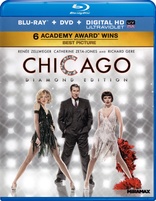
Movie rating
7.3 | / 10 |
Blu-ray rating
| Users | 4.6 | |
| Reviewer | 4.0 | |
| Overall | 4.5 |
Overview
Chicago (2002)
At a time when crimes of passion result in celebrity headlines, nightclub sensation Velma Kelly and spotlight-seeking Roxie Hart both find themselves sharing space on Chicago's famed Murderess Row! They also share Billy Flynn, the town's slickest lawyer with a talent for turning notorious defendants into local legends. But in Chicago there's only room for one legend!
Starring: Renée Zellweger, Catherine Zeta-Jones, Richard Gere, Queen Latifah, John C. ReillyDirector: Rob Marshall
| Comedy | Uncertain |
| Musical | Uncertain |
| Period | Uncertain |
| Drama | Uncertain |
| Crime | Uncertain |
Specifications
Video
Video codec: MPEG-4 AVC
Video resolution: 1080p
Aspect ratio: 1.85:1
Original aspect ratio: 1.85:1
Audio
English: Dolby TrueHD 7.1 (96kHz, 16-bit)
Spanish: Dolby Digital 5.1
English: Dolby Digital 5.1 (448 kbps)
7.1: 96kHz, 16-bit
Subtitles
English SDH
Discs
50GB Blu-ray Disc
Two-disc set (1 BD, 1 DVD)
UV digital copy
DVD copy
Packaging
Slipcover in original pressing
Playback
Region free
Review
Rating summary
| Movie | 4.0 | |
| Video | 5.0 | |
| Audio | 5.0 | |
| Extras | 3.0 | |
| Overall | 4.0 |
Chicago Blu-ray Movie Review
Now even jazzier.
Reviewed by Jeffrey Kauffman February 12, 2014The venerable adage goes "if it ain't broke, don't fix it", which may be a pertinent issue to raise with Lionsgate's perhaps
surprising decision to remaster and re-release Chicago, a Blu-ray which in its original incarnation got fairly
uniformly positive reactions (including by yours truly here at Blu-ray.com). Well, another adage goes "nothing ventured,
nothing gained", and perhaps Lionsgate is hoping that those who didn't purchase the film the first time around will
spring for it now, while the allure of a new bonus documentary may make previous purchasers consider double dipping.
We'll address the technical merits and new supplementary material of this release below, but first I'm including my
thoughts on the show and film from my first review.
For those of you who were lucky enough to catch a Bob Fosse staged show on Broadway, you’ll know what I mean
when I say, both unashamedly and unabashedly, that the master showman’s touch could literally change your life. I
was a kid when I visited family in New York City and through one of my Uncles’ connections was able to get front row
tickets for Pippin, a show that was then playing to standing room only audiences. With an incredible cast
including John Rubinstein, Jill Clayburgh, Ben Vereen, and The Beverly Hillbillies’ own “Granny,” Irene Ryan,
Pippin was one of the first major Broadway musicals to utilize television advertising to cement its box office
appeal. Why the show took a while to really catch fire is anyone’s guess, but I can tell you as a youngster sitting in the
audience that night, at my first ever Broadway musical (as opposed to touring or bus and truck productions), I was
awestruck by the genius Fosse employed throughout the staging. From the first moment, where the entire proscenium
was aglow with blacklit gloved hands, through two hours of unbelievably brilliant choreography and stagecraft, I simply
could not believe my eyes. Fosse ultimately became something of a born again wunderkind that year, with
Pippin winning him two Tony Awards, his film version of Cabaret netting him an Oscar, and his television
special Liza With a Z handing him an Emmy, a rare example of an artist managing a triple crown of major awards
in little more than a year. (I should add that my wife and I took our own sons to the current revival of Pippin
when we were in New York City last summer, a show that's co-produced by a friend of mine, and while it was
phenomenally entertaining, in my not so humble opinion, it didn't hold a candle to the staging of the original.)
Though Fosse worked on a couple of special theatrical presentations after Pippin, his next “real” musical was
1975’s Chicago, a show that actually opened to better reviews than Pippin had, and which went on to a
substantial, multi-year run, but which in one of those strange vagaries of history, got somewhat buried under the
onslaught of a little show (and critical darling) called A Chorus Line. Though Chicago’s original Broadway
iteration had the incredible talents of Jerry Orbach, Gwen Verdon (the ex-Mrs. Fosse, of course) and Chita Rivera, and
featured a marvelous pastiche laden score by the great John Kander and Fred Ebb (of Cabaret fame), it
seemed fated to reside in that strange netherworld of fairly successful shows which nonetheless never rise to the level
of an unforgettable classic. That was the case, anyway, until over two decades after the original version
opened, when in 1996 a new, stripped down production opened to rave reviews and pretty much unanimous audience
acclaim. That production, incredibly, is still running today (with different stars, obviously), having gotten well past the
7,000 performance mark. Finally Hollywood stood up and took notice of the property in real terms (it had been bandied
about from studio to studio for years, including with Fosse himself attached to direct). But there really hadn’t been a
successful film musical in years, and no one knew how to translate Chicago’s unabashed theatricality to film (the
show is told as a succession of vaudeville “acts” in its original Broadway version). Attempt after attempt to make the
property filmically viable ended in failure, until finally director Rob Marshall hit upon the idea which enabled the project to
both stay true to its roots and also exploit the medium of cinema.
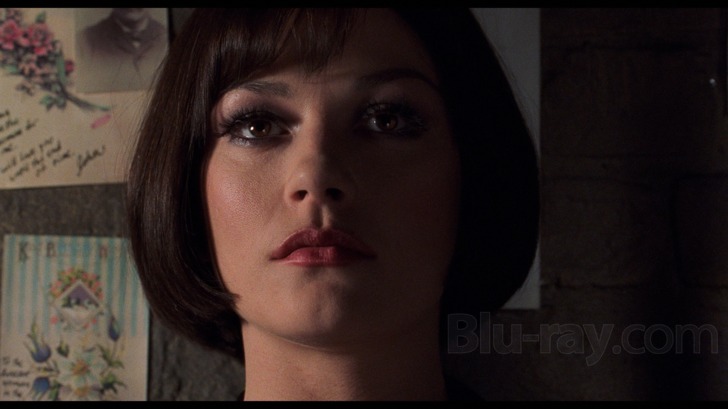
My hunch is your reaction to the film version of Chicago is going to be based more or less largely upon your age and personal experience with film musicals. As much as I may raise the hackles of some readers, I am not one of those who gives Chicago in its film version unqualified raves. Marshall’s at least understandable decision to place all the musical sequences in the mind’s eye of "murderess" Roxie Hart (Renee Zellweger) perhaps goes down more easily with younger folk for whom the patent unreality of seeing someone suddenly break out into song disrupts their attention and the flow of the film. I grew up at the tail end of the great era of film musicals, and never really thought too much about how odd it was to see Julie Andrews burst into song, for example. I personally find this “cheat” on the part of Marshall ultimately fine, but at the same time troubling for the show’s central thesis that the tabloidization of tragedy is a showbiz phenomenon in and of itself. (It should be noted for those of you who aren’t aware that the musical is culled from the great straight play Chicago which was adapted into the marvelous Ginger Rogers romp Roxie Hart back in the 1940’s, proving that PR machines are not something endemic to our current generation). Having everything, musical comedy wise, exist only in the recesses of Hart’s mind completely robs the show of some of its satiric edge, one of the strong points of the original musical book by Fosse and Ebb.
Also at least a little troubling to semi-old fogeys like myself is the breakneck pace of the editing, especially in the dance sequences. Take a look at any of the three great film musicals Fosse himself helmed, Sweet Charity, Cabaret, or All that Jazz (whose title, of course, is derived from one of the songs from Chicago). While Jazz did in fact prefigure some of this quick cutting, Fosse never cheated the audience in terms of being able to see clearly that dancers were performing sequences whole, without the benefit of short, sometimes seconds-long, takes perhaps helping to cover any terpsichorean gaffes. Even more impressive in this regard are the phenomenally long takes in Cabaret and especially Sweet Charity where the viewer is able to see clearly Fosse’s incredibly organic choreographic style, performed by dancers of his own choosing and under his own tutelage. There’s nothing wrong per se with Chicago’s rapid fire approach to these “faux-se” dances, but cynics like myself can’t help but wonder how many three second long takes of certain moments had to be filmed to get everything “just right.”
With these perhaps curmudgeonly caveats aside, Chicago as a film does come closer than any recent effort in recreating the thrill and visceral excitement of the best film musicals of yore. Oscar winner Catherine Zeta-Jones brings flash and panache to her scheming Velma Kelly. Zellweger is sweet and yet somewhat sinister as Hart, and Richard Gere is surprisingly spry and affable as shyster Billy Flynn. Supporting cast members are uniformly excellent, including great star turns by Queen Latifah and John Reilly.
Marshall came up to bat again with another film musical based on a Broadway success, Nine, and again utilized the Chicago “fantasy” element to clothe his musical numbers. That facet actually played a little better with that property, as it is by nature caught up in the artifice of memory and filmmaking, and so was perhaps better suited to the “mind’s eye” approach. I can’t help but wish, though, that filmmakers had enough faith in their audiences to just, in those great words of Rooney and Garland, “put on a show” without this psycho-babble artifice. After all, kids born since the heyday of the great musicals grew up with MTV, for crying out loud, and so shouldn’t be too shocked to see someone break out into song. Marshall at least has command of his camera and stages the musical numbers with flair and aplomb, bringing a certain consistent momentum to the film’s many sung moments.
The sad part of Chicago, the film, is wondering what Fosse himself might have made of it. Probably no director of the past 50 years was as blatantly theatrical or as innovative with adapting musicals to film than was Fosse. If some of his neomodern escapades in Sweet Charity seem quaintly old fashioned to us now, his post-modernist revision of Cabaret, and his bitterly vicious self-examination in All that Jazz, prove that he was a master of rare insight and perhaps more importantly, technique. If Rob Marshall is a sort of pale imitation of the original, he at least had the good sense not to jettison Fosse’s jaded eye and “jazz hands.”
Chicago Blu-ray Movie, Video Quality 
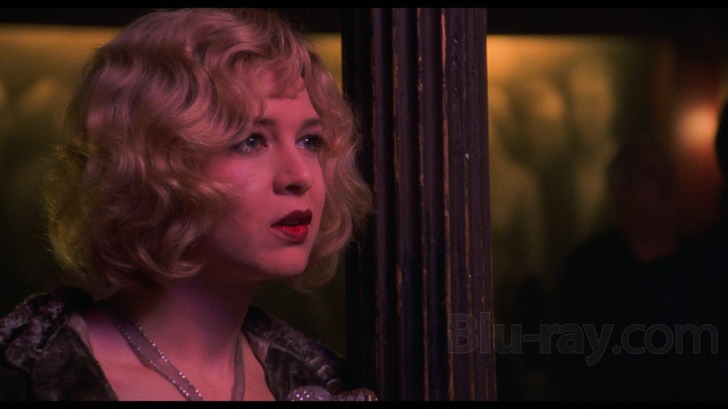
Chicago: Diamond Edition is presented on Blu-ray courtesy of Lionsgate Films with an AVC encoded 1080p transfer in 1.85:1. There's been some PR hype surrounding this release, as the new master was prepared in Dolby Vision, a relatively recent proprietary technique that is said to significantly boost detail and contrast. What the PR hype isn't telling you (at least, unless you read the "fine print") is that while the master was prepared in Dolby Vision, compatible playing and viewing equipment (not currently available) is needed to fully enjoy the results. This situation is perhaps analogous to watching a Blu-ray on an old cathode ray television only capable of 480 resolution and lo-fi audio. Somewhere in there is HD content, but you're sure not seeing or hearing it. Be that as it may, there are indeed noticeable differences between the previous Blu-ray and this one. Detail is improved, if not markedly, at least noticeably. Part of this is due to the increased contrast, which is most noticeable in the darker scenes. One thing that some people found problematic with the first release was what some viewed as "excessive" grain, ignoring the fact that evidently Marshall and his DP Dion Beebe "pushed" the film in many of the darker or filtered segments, something that will automatically increase evident grain. Those who felt the first version was somehow "too" grainy will probably have the same issue with this release, and perhaps even more so, as grain structure is perhaps even more evident in the pushed sequences than before. Colors are beautifully saturated and accurate looking. It's hard to imagine Chicago looking any better—at least until Dolby Vision compatible discs, players and televisions come along.
Chicago Blu-ray Movie, Audio Quality 
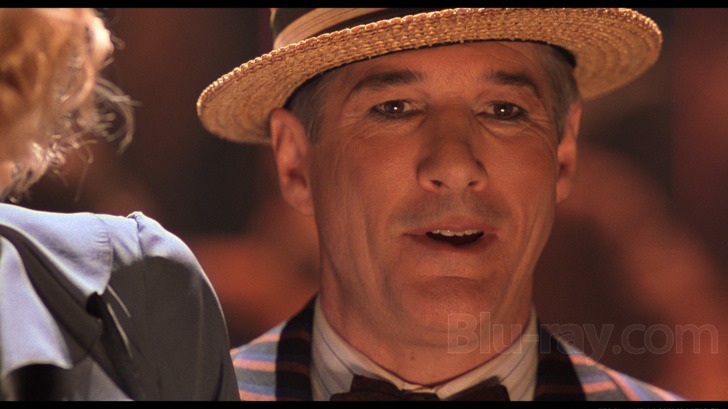
I personally found the LPCM 5.1 mix on the previous Blu-ray of Chicago to be reference quality, but there's little question that the new Dolby TrueHD 7.1 mix ups the ante at least marginally with regard to rear channel separation and action (maybe it's time to borrow an idea from Nigel in This is Spinal Tap and turn our rating systems up to 5.5). This new 7.1 mix tends to slightly open up both the orchestral and massed ensemble singing the most, though some of the other foley effects, including panning effects and even discrete channelization, are more viscerally present in this new iteration. As before, everything is crytal clear, without a hint of distortion or any other problems.
Chicago Blu-ray Movie, Special Features and Extras 
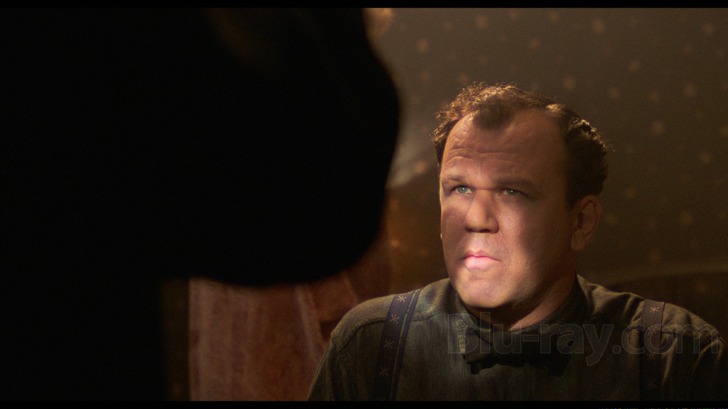
Quite a few of the supplements which graced the first Blu-ray release of Chicago have been dropped for this release (two of them, the deleted "Class" scene and the "From Stage to Screen" featurette, are at least on the included DVD in this combo pack. For a complete list of the supplements on the first release, consult our Chicago Blu-ray review .
- Chicago in the Spotlight: A Retrospective with the Cast and Crew (1080p; 2:22:19) is an incredibly in depth set of featurettes which covers just about all of the material that was featured in the now jettisoned featurettes from the first Blu-ray release. Everything from the adaptive process to casting to rehearsals and shooting are covered, with all new interviews with most of the principal cast and crew.
- Extended Musical Performances include:
- And All That Jazz (480i; 6:07)
- When You're Good to Mama (480i; 3:33)
- Cell Block Tango (480i; 8:02)
- We Both Reached for the Gun (480i; 6:37)
- Mister Cellophane (480i; 4:00)
- All I Care About (480i; 4:43)
- All I Care About with Richard Gere (480i; 3:30)
- Nowadays with Renee Zellweger (480i; 2:08)
- And All That Jazz with Catherine Zeta-Jones (480i; 3:03)
- I Can't Do It Alone Rehearsal (480i; 3:46)
- Nowadays/Hot Honey Rag Rehearsal (480i; 3:31)
- We Both Reached for the Gun Rehearsal (480i; 3:58)
- Cell Block Tango Rehearsal (480i; 3:12)
- Feature Commentary with Director Rob Marshall and Screenwriter Bill Condon
Chicago Blu-ray Movie, Overall Score and Recommendation 
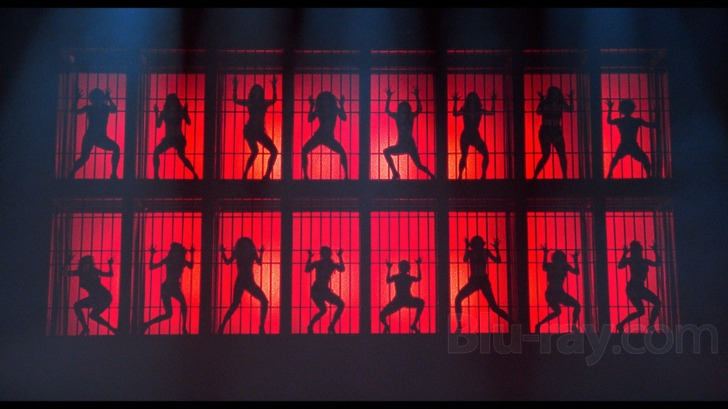
As I mentioned in our review of the first Blu-ray release of Chicago, the film's "mind's eye" gambit may rub theatrical purists the wrong way. But taken on its own terms, Chicago still delivers a fair amount of the original's "razzle dazzle", even if it's missing some of Fosse's patented acerbic point of view. This new Blu-ray has beautiful video and audio, though double dippers should be aware that not all of the bonus material has made it to this version. On the whole, though, Chicago: Diamond Edition comes Highly recommended.
Similar titles
Similar titles you might also like

Rent
2005

Hairspray
2-Disc Shake and Shimmy Edition
2007

Dreamgirls
2-Disc Showstopper Edition
2006

Burlesque
2010

Glee: The Complete First Season
2009-2010

Across the Universe
2007

Thoroughly Modern Millie
1967

Robin and the 7 Hoods
1964

Mamma Mia! Here We Go Again
Sing-Along Edition
2018

Funny Girl 4K
1968

Hello, Dolly!
Fox Studio Classics
1969

Mamma Mia! 4K
10th Anniversary Edition
2008

Grease 2
1982

Singin' in the Rain 4K
70th Anniversary Edition
1952

Guys and Dolls
Warner Archive Collection
1955

Camp
2003

The Producers
2005

There's No Business Like Show Business
1954

Rock of Ages
2012

The Last Five Years
2014




